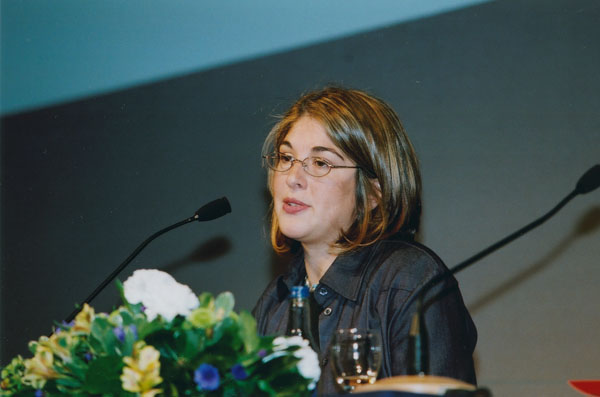|
No Logo
''No Logo: Taking Aim at the Brand Bullies'' is a book by the Canadian author Naomi Klein. First published by Knopf Canada and Picador in December 1999, shortly after the 1999 Seattle WTO protests had generated media attention around such issues, it became one of the most influential books about the alter-globalization movement and an international bestseller. Focus The book focuses on branding and often makes connections with the anti-globalization movement. Throughout the four parts ("No Space", "No Choice", "No Jobs", and "No Logo"), Klein writes about issues such as sweatshops in the Americas and Asia, culture jamming, corporate censorship, and Reclaim the Streets. She pays special attention to the deeds and misdeeds of Nike, The Gap, McDonald's, Shell, and Microsoft – and of their lawyers, contractors, and advertising agencies. Many of the ideas in Klein's book derive from the influence of the Situationists, an art/political group founded in the late 1950s. While globaliz ... [...More Info...] [...Related Items...] OR: [Wikipedia] [Google] [Baidu] |
Naomi Klein
Naomi A. Klein (born May 8, 1970) is a Canadian author, social activist, and filmmaker known for her political analyses, support of ecofeminism, organized labour, left-wing politics and criticism of corporate globalization, fascism, ecofascism and capitalism. As of 2021 she is Associate Professor, and Professor of Climate Justice at the University of British Columbia, co-directing a Centre for Climate Justice. Klein first became known internationally for her alter-globalization book ''No Logo'' (1999). '' The Take'' (2004), a documentary film about Argentina's occupied factories, written by her and directed by her husband Avi Lewis, further increased her profile, while ''The Shock Doctrine'' (2007), a critical analysis of the history of neoliberal economics, solidified her standing as a prominent activist on the international stage. ''The Shock Doctrine'' was adapted into a six-minute companion film by Alfonso and Jonás Cuarón, as well as a feature-length documentary by Mic ... [...More Info...] [...Related Items...] OR: [Wikipedia] [Google] [Baidu] |
McDonald's Corporation
McDonald's Corporation is an American multinational fast food chain, founded in 1940 as a restaurant operated by Richard and Maurice McDonald, in San Bernardino, California, United States. They rechristened their business as a hamburger stand, and later turned the company into a franchise, with the Golden Arches logo being introduced in 1953 at a location in Phoenix, Arizona. In 1955, Ray Kroc, a businessman, joined the company as a franchise agent and proceeded to purchase the chain from the McDonald brothers. McDonald's had its previous headquarters in Oak Brook, Illinois, but moved its global headquarters to Chicago in June 2018. McDonald's is the world's largest restaurant chain by revenue, serving over 69 million customers daily in over 100 countries in more than 40,000 outlets as of 2021. McDonald's is best known for its hamburgers, cheeseburgers and french fries, although their menus include other items like chicken, fish, fruit, and salads. Their most well-know ... [...More Info...] [...Related Items...] OR: [Wikipedia] [Google] [Baidu] |
Third World
The term "Third World" arose during the Cold War to define countries that remained non-aligned with either NATO or the Warsaw Pact. The United States, Canada, Japan, South Korea, Western European nations and their allies represented the " First World", while the Soviet Union, China, Cuba, North Korea, Vietnam and their allies represented the "Second World". This terminology provided a way of broadly categorizing the nations of the Earth into three groups based on political divisions. Strictly speaking, "Third World" was a political, rather than an economic, grouping. Since the dissolution of the Soviet Union and the end of the Cold War, the term ''Third World'' has decreased in use. It is being replaced with terms such as developing countries, least developed countries or the Global South. The concept itself has become outdated as it no longer represents the current political or economic state of the world and as historically poor countries have transited different income stages ... [...More Info...] [...Related Items...] OR: [Wikipedia] [Google] [Baidu] |
Multinational Corporation
A multinational company (MNC), also referred to as a multinational enterprise (MNE), a transnational enterprise (TNE), a transnational corporation (TNC), an international corporation or a stateless corporation with subtle but contrasting senses, is a corporate organization that owns and controls the production of goods or services in at least one country other than its home country. Control is considered an important aspect of an MNC, to distinguish it from international portfolio investment organizations, such as some international mutual funds that invest in corporations abroad simply to diversify financial risks. Black's Law Dictionary suggests that a company or group should be considered a multinational corporation "if it derives 25% or more of its revenue from out-of-home-country operations". Most of the largest and most influential companies of the modern age are publicly traded multinational corporations, including '' Forbes Global 2000'' companies. History Colonialism Th ... [...More Info...] [...Related Items...] OR: [Wikipedia] [Google] [Baidu] |
Pepsi
Pepsi is a carbonated soft drink manufactured by PepsiCo. Originally created and developed in 1893 by Caleb Bradham and introduced as Brad's Drink, it was renamed as Pepsi-Cola in 1898, and then shortened to Pepsi in 1961. History Pepsi was first invented in 1893 as "Brad's Drink" by Caleb Bradham, who sold the drink at his drugstore in New Bern, North Carolina. It was renamed Pepsi-Cola in 1898, "Pepsi" because it was advertised to relieve dyspepsia (indigestion) and "Cola" referring to the cola flavor. Some have also suggested that "Pepsi" may have been a reference to the drink aiding digestion like the digestive enzyme pepsin, but pepsin itself was never used as an ingredient to Pepsi-Cola. The original recipe also included sugar and vanilla. Bradham sought to create a fountain drink that was appealing and would aid in digestion and boost energy. In 1903, Bradham moved the bottling of Pepsi from his drugstore to a rented warehouse. That year, Bradham sold 7,968 gallons ... [...More Info...] [...Related Items...] OR: [Wikipedia] [Google] [Baidu] |
Baby Boomers
Baby boomers, often shortened to boomers, are the Western demographic cohort following the Silent Generation and preceding Generation X. The generation is often defined as people born from 1946 to 1964, during the mid-20th century baby boom. The dates, the demographic context, and the cultural identifiers may vary by country. The baby boom has been described variously as a "shockwave" and as "the pig in the python". Most baby boomers are children of either the Greatest Generation or the Silent Generation, and are often parents of late Gen Xers and Millennials. Late baby boomers can also be the parents of older members of Generation Z. In the West, boomers' childhoods in the 1950s and 1960s had significant reforms in education, both as part of the ideological confrontation that was the Cold War, and as a continuation of the interwar period. In the 1960s and 1970s, as this relatively large number of young people entered their teens and young adulthood—the oldest turned 18 in ... [...More Info...] [...Related Items...] OR: [Wikipedia] [Google] [Baidu] |
Japanese Asset Price Bubble
The was an economic bubble in Japan from 1986 to 1991 in which real estate and stock market prices were greatly inflated. In early 1992, this price bubble burst and Japan's economy stagnated. The bubble was characterized by rapid acceleration of asset prices and overheated economic activity, as well as an uncontrolled money supply and credit expansion.Kunio Okina, Masaaki Shirakawa, and Shigenori Shiratsuka (February 2001):The Asset Price Bubble and Monetary Policy: Japan's Experience in the Late 1980s and the Lessons More specifically, over-confidence and speculation regarding asset and stock prices were closely associated with excessive monetary easing policy at the time.Edgardo Demaestri, Pietro Masci (2003): Financial Crises in Japan and Latin America, Inter-American Development Bank Through the creation of economic policies that cultivated the marketability of assets, eased the access to credit, and encouraged speculation, the Japanese government started a prolonged an ... [...More Info...] [...Related Items...] OR: [Wikipedia] [Google] [Baidu] |
Black Monday (1987)
Black Monday is the name commonly given to the global, sudden, severe, and largely unexpected stock market crash on Monday, October 19, 1987. In Australia and New Zealand, the day is also referred to as ''Black Tuesday'' because of the time zone difference from other English-speaking countries. All of the twenty-three major world markets experienced a sharp decline in October 1987. When measured in United States dollars, eight markets declined by 20 to 29%, three by 30 to 39% (Malaysia, Mexico and New Zealand), and three by more than 40% (Hong Kong, Australia and Singapore). The least affected was Austria (a fall of 11.4%) while the most affected was Hong Kong with a drop of 45.8%. Out of twenty-three major industrial countries, nineteen had a decline greater than 20%. Worldwide losses were estimated at US$1.71 trillion. The severity of the crash sparked fears of extended economic instability or even a reprise of the Great Depression. The degree to which the stock market crashe ... [...More Info...] [...Related Items...] OR: [Wikipedia] [Google] [Baidu] |
Latin American Debt Crisis
The Latin American debt crisis ( es, Crisis de la deuda latinoamericana; pt, Crise da dívida latino-americana) was a financial crisis that originated in the early 1980s (and for some countries starting in the 1970s), often known as ''La Década Perdida'' (The Lost Decade), when Latin American countries reached a point where their foreign debt exceeded their earning power, and they were not able to repay it. Origins In the 1960s and 1970s, many Latin American countries, notably Brazil, Argentina, and Mexico, borrowed huge sums of money from international creditors for industrialization, especially infrastructure programs. These countries had soaring economies at the time, so the creditors were happy to provide loans. Initially, developing countries typically garnered loans through public routes like the World Bank. After 1973, private banks had an influx of funds from oil-rich countries which believed that sovereign debt was a safe investment. Mexico borrowed against future ... [...More Info...] [...Related Items...] OR: [Wikipedia] [Google] [Baidu] |
Globalization
Globalization, or globalisation (Commonwealth English; see spelling differences), is the process of interaction and integration among people, companies, and governments worldwide. The term ''globalization'' first appeared in the early 20th century (supplanting an earlier French term ''mondialization''), developed its current meaning some time in the second half of the 20th century, and came into popular use in the 1990s to describe the unprecedented international connectivity of the post-Cold War world. Its origins can be traced back to 18th and 19th centuries due to advances in transportation and communications technology. This increase in global interactions has caused a growth in international trade and the exchange of ideas, beliefs, and culture. Globalization is primarily an economic process of interaction and integration that is associated with social and cultural aspects. However, disputes and international diplomacy are also large parts of the history of globalizat ... [...More Info...] [...Related Items...] OR: [Wikipedia] [Google] [Baidu] |
Situationist International
The Situationist International (SI) was an international organization of social revolutionaries made up of avant-garde artists, intellectuals, and political theorists. It was prominent in Europe from its formation in 1957 to its dissolution in 1972. The intellectual foundations of the Situationist International were derived primarily from libertarian Marxism and the avant-garde art movements of the early 20th century, particularly Dada and Surrealism. Overall, situationist theory represented an attempt to synthesize this diverse field of theoretical disciplines into a modern and comprehensive critique of mid-20th century advanced capitalism. Essential to situationist theory was the concept of the spectacle, a unified critique of advanced capitalism of which a primary concern was the progressively increasing tendency towards the expression and mediation of social relations through objects. The situationists believed that the shift from individual expression through directly li ... [...More Info...] [...Related Items...] OR: [Wikipedia] [Google] [Baidu] |
.png)





_by_Erling_Mandelmann.jpg)